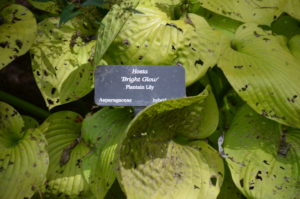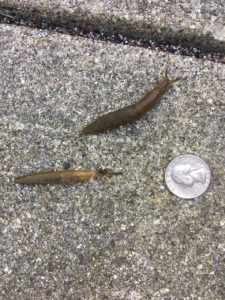Slugs and snails are common pests of many common garden plants. They are particularly troublesome in shady woodland areas. They crawl across leaves and leave a slimy residue over the leaf surface. They feed primarily at night. Ecologically, their niche is to decompose organic matter. During the daytime hours they hide under leaves, mulch, rocks, stepping stones, and other dark areas.
Slugs and snails can be removed by handpicking. Favorite perennial plants are hostas, lungworts (Pulmonaria), and Siberian bugloss (Brunnera) are susceptible perennials as well as many vegetable and herb plants.
Popular control measures include slug and snail control baits that contain iron phosphate, such as Sluggo™, Schultz™ Slug & Snail Bait, and Bayer Advanced™ Snail & Slug Killer Bait. Baits containing metaldehyde are also effective, but are harmful to pets and birds. Read label directions before using.
Popular homemade remedy is the “Beer Bath”. Fill a shallow container with beer and submerged it in the ground with the rim even with the soil. Snails and slugs are attracted to the beer odor, fall in, and drown.
Sprinkling diatomaceous earth around the plants also work. The sharp crystals pierce their thin jelly-like skin resulting in dehydration and death. Diatomaceous earth must be reapplied after a rain or watering.
Other short term remedies that deter snails and slugs include:
- limestone, cinders, coarse dry sawdust, gravel or sand.
- Epson Salts sprinkled on the soil will deter slugs and adds Magnesium nutrient to feed garden plants.
- Spread table salt around your plants. Salt dries them out so they won’t go near it.
- Collect human, dog, or cat hair and place around your susceptible plants; slugs and other critters will stay away.
- Plant specific plants around the edge of the garden which slugs hate the smell. List of anti-slug plants are: mint, chives, garlic, geraniums, foxgloves, and fennel.
- Mix 1 part ammonia to 3 parts of water into an aerosol bottle and give slugs a squirt.



 Posted in
Posted in 
